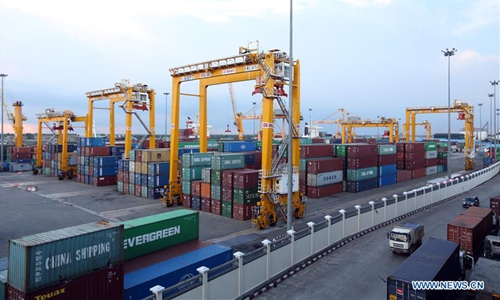Will India miss chance offered by Myanmar?

Photo taken on May 19, 2018, shows the Asia World Port in Yangon, Myanmar. Photo: Xinhua
As China and Myanmar deepen relations, many Westerners believe that India's strategic room in the Indian Ocean region would be squeezed. New Delhi has a similar standpoint, thinking it should strengthen cooperation with countries in the vicinity so as to neutralize the increasing strategic presence of China in the region.
Such viewpoint has influenced India's participation in the China-proposed Belt and Road Initiative (BRI), and it has actually put the two neighbors in opposite positions in a zero-sum game.
However, the reality is, China and India can do a lot in terms of cooperation in Myanmar, which is an important neighbor of the two Asian giants.
The India-Myanmar border line extends over 1,600 kilometers, while the China-Myanmar one is 2,185 kilometers long. Myanmar could be a country in which China and India compete to impose their influence, and it could also be a cooperation platform for the two countries.
In terms of development, South Asia, where India, Pakistan, Afghanistan, Bangladesh, Nepal, Sri Lanka and Bhutan are located, lags Northeast Asia and Southeast Asia. Geographically, Myanmar is a neighbor of China as well as an ASEAN member that is located the closest to India.
Myanmar has realized consecutive growth of more than 6 percent in the past two years, with ASEAN and China as main impetus for its economy. Frankly, the ASEAN Plus Three format - in which China's development plays the vital role - has been an important engine for the global economy. This cannot be contained or neutralized by outside forces.
After the US launched the trade war on China, regional economic integration has been promoted. China accelerated imports from the region while expanding its industry chain overseas. China, Japan, and South Korea are deepening trade relations with ASEAN, members of which are also getting closer.
Most importantly, with the Regional Comprehensive Economic Partnership, this region is forming a vital market that has the potential to have an impact on the entire world. Many Western observers didn't see this coming, which would thus lead to a shortsighted strategy.
In this context, Myanmar can provide more new opportunities for cooperation between China, ASEAN and India. The participation of China and Japan in Myanmar's infrastructure development has contributed to the country's progress. And these infrastructure projects can then better serve foreign investment from India and other countries.
Currently, foreign investments in Myanmar mainly come from ASEAN, China, Japan, and South Korea. China is Myanmar's second-largest investor. According to data from the Directorate of Investment and Company Administration, a Myanmar government agency, China has invested $20.8 billion in Myanmar as of August 2019, accounting for more than 25 percent of total foreign investment in the Southeast Asian country.
India seems to have not seized the big strategic opportunity in time. "India's share in the total envisaged investments into Myanmar from 2011 to September 2019 stands abysmally low at 3.7 percent," according to a Hindu BusinessLine report.
Foreign investors are increasing investment in Myanmar's infrastructure and manufacturing industry, possibly making the country a new star in manufacturing. If India fails to expand cooperation with Myanmar in time, it may face another competitor in manufacturing.
If India abandons prejudice of the BRI, it will have a chance to cooperate with China in more relevant projects. This would help more capital from India flow into Myanmar. As part of efforts to make Myanmar the doorway to ASEAN, the government will try to establish a Myanmar-India-China Economic Corridor, Myanmar's Yangon Region Chief Minister U Phyo Min Thein has said.
Apparently, as Myanmar develops, China and India will have more opportunities of cooperation in the country. But if New Delhi weighs too much the strategic balance, it may lose more chance to participate in Myanmar's growth, and thus cannot share the fruits of common development.
The author is a senior editor with People's Daily, and currently a senior fellow with the Chongyang Institute for Financial Studies at Renmin University of China. dinggang@globaltimes.com.cn. Follow him on Twitter @dinggangchina




